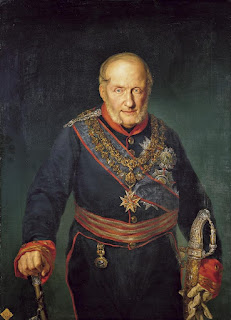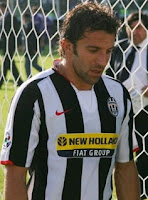Luca Zingaretti - actor
Found fame as TV detective Inspector Montalbano
The actor Luca Zingaretti, best known for his portrayal of Inspector Montalbano in the TV series based on Andrea Camilleri's crime novels, was born on this day in 1961 in Rome. The Montalbano mysteries, now into a 10th series, began broadcasting on Italy's RAI network in 1999 and has become a hit in several countries outside Italy, including France, Spain, Australia, the United States and the United Kingdom. Zingaretti has played the famously maverick Sicilian detective in all 28 feature-length episodes to date, each one based on a novel or short story collection by the Sicilian-born author Camilleri, now in his 92nd year but still writing. Although he had established himself as a stage actor and had appeared in a number of films, it was the part of Montalbano that established Zingaretti's fame. Yet he had hoped to become a star on another kind of stage as a professional footballer. Growing up in the Magliana neighbourhood in the south-west of Rome, he spent as much time as he could out in the streets kicking a ball and played for a number of junior teams. Read more…
________________________________________________________________
Andrea Zani – violinist and composer
Musician who ushered in the new classical era
Andrea Teodora Zani, one of the earliest Italian composers to move away from the Baroque style, was born on this day in 1696 in Casalmaggiore in the province of Cremona in Lombardy. Casalmaggiore, nicknamed ‘the little Venice on the Po’, was a breeding ground for musical talent at this time and Zani was an exact contemporary of Giuseppe Guarneri, the most famous member of the Guarneri family of violin makers in Cremona. He was just a bit younger than the violinist composers, Francesco Maria Veracini, Giuseppe Tartini and Pietro Locatelli. Zani’s father, an amateur violinist, gave him his first violin lessons and he later received instruction from Giacomo Civeri, a local musician, and Carlo Ricci, who was at the time court musician to the Gonzaga family at their palace in Guastalla. After Zani played in front of Antonio Caldara, who was Capellmeister for the court of Archduke Ferdinand Charles in nearby Mantua, he was invited to go to Vienna to be a violinist in the service of the Habsburgs. A lot of Zani’s work has survived in both published and manuscript form, some of it having been recovered from European libraries. His early works show the influence of Antonio Vivaldi. Read more…
________________________________________________________________
Victor Emmanuel III
Birth of the King who ruled Italy through two world wars
Italy’s longest reigning King, Victor Emmanuel III (Vittorio Emanuele III di Savoia), was born on this day in Naples in 1869. The only child of King Umberto I and Queen Margherita of Savoy, he was given the title of Prince of Naples. He became King of Italy in 1900 after his father was assassinated in Monza. During the reign of Victor Emmanuel III, Italy was involved in two world wars and experienced the rise and fall of Fascism. At the height of his popularity he was nicknamed by the Italians Re soldato (soldier King) and Re vittorioso (victorious King) because of Italy’s success in battle during the First World War. He was also sometimes called sciaboletta (little sabre) as he was only five feet (1.53m) tall. Italy had remained neutral at the start of the First World War but signed treaties to go into the war on the side of France, Britain and Russia in 1915. Victor Emmanuel III enjoyed popular support as a result of visiting areas in the north affected by the fighting while his wife, Queen Elena, helped the nurses care for the wounded. But the instability after the First World War led to Mussolini’s rise to power. Read more…
__________________________________________________________________
Germano Mosconi – sports writer and presenter
Short-tempered journalist who became the news
Germano Mosconi, who became a well-known television personality, was born on this day in 1932 in San Bonifacio in the Veneto. Mosconi became notorious for his short temper and swearing on air and was regarded as a bit of a character on local television. But he became known all over Italy and throughout the world after a video of him someone posted anonymously on the internet went viral. In the 1980s Mosconi delivered sports reports on Telenuovo in Verona and in 1982 he received the Cesare d’Oro international award for journalistic merit. But he later became known for his excessive swearing and blaspheming. The anonymous video showed his irate reactions to various problems he encountered while broadcasting, such as people unexpectedly entering the studio, background noises and illegible writing on the news sheets he received. His use of swear words, blasphemy and insults in both Italian and Venetian dialect and his other humorous antics made the video compulsive viewing all over the world. Read more…
Home


























